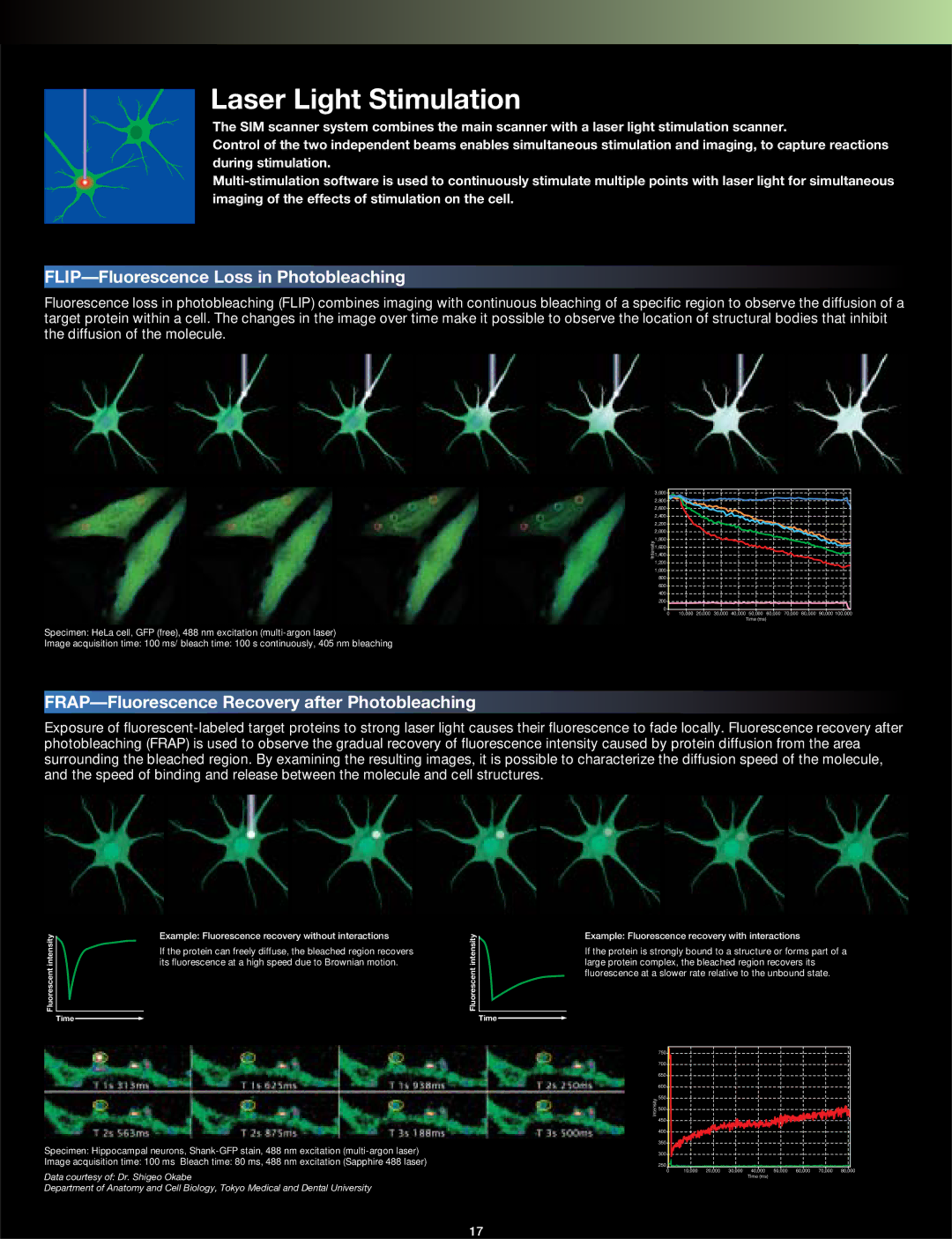
Laser Light Stimulation
The SIM scanner system combines the main scanner with a laser light stimulation scanner.
Control of the two independent beams enables simultaneous stimulation and imaging, to capture reactions during stimulation.
FLIP—Fluorescence Loss in Photobleaching
Fluorescence loss in photobleaching (FLIP) combines imaging with continuous bleaching of a specific region to observe the diffusion of a target protein within a cell. The changes in the image over time make it possible to observe the location of structural bodies that inhibit the diffusion of the molecule.
| 3,000 |
|
|
|
|
|
|
|
|
|
| 2,800 |
|
|
|
|
|
|
|
|
|
| 2,600 |
|
|
|
|
|
|
|
|
|
| 2,400 |
|
|
|
|
|
|
|
|
|
| 2,200 |
|
|
|
|
|
|
|
|
|
| 2,000 |
|
|
|
|
|
|
|
|
|
Intensity | 1,800 |
|
|
|
|
|
|
|
|
|
1,600 |
|
|
|
|
|
|
|
|
| |
1,400 |
|
|
|
|
|
|
|
|
| |
1,200 |
|
|
|
|
|
|
|
|
| |
|
|
|
|
|
|
|
|
|
| |
| 1,000 |
|
|
|
|
|
|
|
|
|
| 800 |
|
|
|
|
|
|
|
|
|
| 600 |
|
|
|
|
|
|
|
|
|
| 400 |
|
|
|
|
|
|
|
|
|
| 200 |
|
|
|
|
|
|
|
|
|
| 0 | 10,000 | 20,000 | 30,000 | 40,000 | 50,000 | 60,000 | 70,000 | 80,000 | 90,000 100,000 |
| 0 |
Time (ms)
Specimen: HeLa cell, GFP (free), 488 nm excitation
Image acquisition time: 100 ms/ bleach time: 100 s continuously, 405 nm bleaching
FRAP—Fluorescence Recovery after Photobleaching
Exposure of
intensity |
| Example: Fluorescence recovery without interactions |
| its fluorescence at a high speed due to Brownian motion. | |
|
| If the protein can freely diffuse, the bleached region recovers |
Fluorescent | Time |
|
|
| |
|
|
|
Specimen: Hippocampal neurons,
Image acquisition time: 100 ms Bleach time: 80 ms, 488 nm excitation (Sapphire 488 laser)
Data courtesy of: Dr. Shigeo Okabe
Department of Anatomy and Cell Biology, Tokyo Medical and Dental University
Fluorescent intensity
Time ![]()
Example: Fluorescence recovery with interactions
If the protein is strongly bound to a structure or forms part of a large protein complex, the bleached region recovers its fluorescence at a slower rate relative to the unbound state.
| 750 |
|
|
|
|
|
|
|
|
| 700 |
|
|
|
|
|
|
|
|
| 650 |
|
|
|
|
|
|
|
|
| 600 |
|
|
|
|
|
|
|
|
Intensity | 550 |
|
|
|
|
|
|
|
|
500 |
|
|
|
|
|
|
|
| |
450 |
|
|
|
|
|
|
|
| |
|
|
|
|
|
|
|
|
| |
| 400 |
|
|
|
|
|
|
|
|
| 350 |
|
|
|
|
|
|
|
|
| 300 |
|
|
|
|
|
|
|
|
| 250 |
|
|
|
|
|
|
|
|
| 0 | 10,000 | 20,000 | 30,000 | 40,000 | 50,000 | 60,000 | 70,000 | 80,000 |
|
|
|
|
| Time (ms) |
|
|
|
|
17
